14. The Dead Mother (La madre muerta, 1992) – directed by Juanma Bajo Ulloa
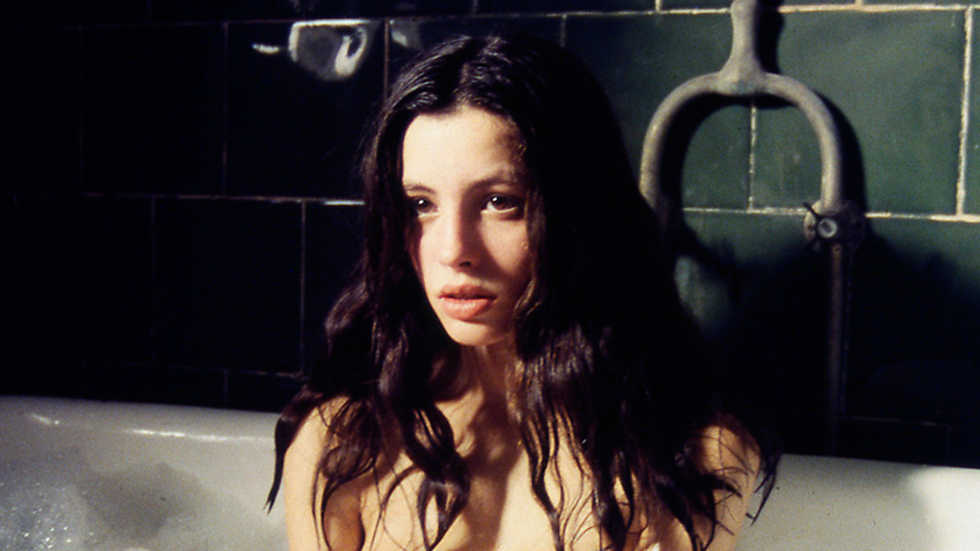
This dark and deeply disturbing drama-thriller is one of the best works of director Juanma Bajo Ulloa (who also directed the very funny road movie-comedy “Airbag” in 1997). It’s really a shame that “La madre muerta” is not more widely known outside of Spain because it’s really an unique work of a very interesting author.
The story begins as Ismael Lopez (Karra Elejalde, from “Timecrimes“) breaks into the house of a painting restorer and shoots her. Also, he shoots and wounds her young daughter, Leire (Raquel Santamaría). Years later we discover that she is in a mental institution.
As the result of past events, Laire (now played by Ana Álvarez) is left traumatized and deaf for life. Ismael still leads a criminal life with his girlfriend, Maite (Lio), but he will soon cross paths with Leire, and fearing that she will remember and report him, he kidnaps her and takes her to his place, planning to kill her.
But somehow he cannot do that, and from that moment, the movie goes into some very disturbing and at times touching places. While Ismael develops some sort of a relationship with Laire, Maite is not happy about the new situation.
The direction is secure and Ulloa masterfully leads his story, changing tones from tragic to bizarre to macabre, and at some points, blackly funny. The characters’ feelings and thought processes is reflected through the style of the scene (a good example is the scene when Ismael sees Laire for the second time).
Ulloa infuses the film with a great amount of energy. It’s a dark, twisted, and brave film, one of the best Spanish movies of the 90s, and one that desperately needs to be rediscovered and more widely seen.
13. Carne trémula (Live Flesh, 1997) – directed by Pedro Almodóvar
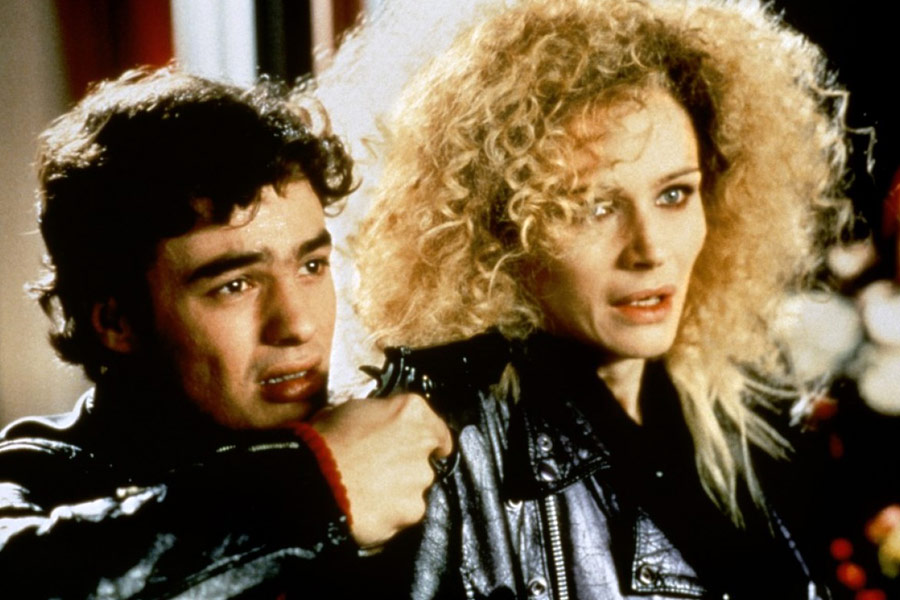
Initially met with positive reviews and solid box office returns, in the years to follow, the film didn’t get much praise from the fans of Almodóvar’s films, likely because it was a structurally different and a ‘tighter’ film and more raw on a visceral level than many of his previous and following works. It’s a very well-made mix of a thriller and a melodrama.
The main story centers around love triangle between ex-convict Víctor (Liberto Rabal); Elena (Francesca Neri), a girl with whom he unsuccessfully tried to start a relationship; and David (Javier Bardem), a wheelchair-bound cop who was wounded in a shootout during the brawl between Victor and Elena, and who later married her while Victor was in prison.
The acting is excellent, the direction a lot less free-spirited than Almodóvar’s previous films (those movies worked well with that kind of direction, but this one required a different approach), and the film has a big emotional impact without being sentimental. Almodóvar made good use of sentimentality in his previous films, but this is a completely different film in that matter. This is one of the strongest Almodóvar films that deserves a place among his best works.
12. Jamón Jamón (A Tale of Ham and Passion, 1992) – directed by Bigas Luna
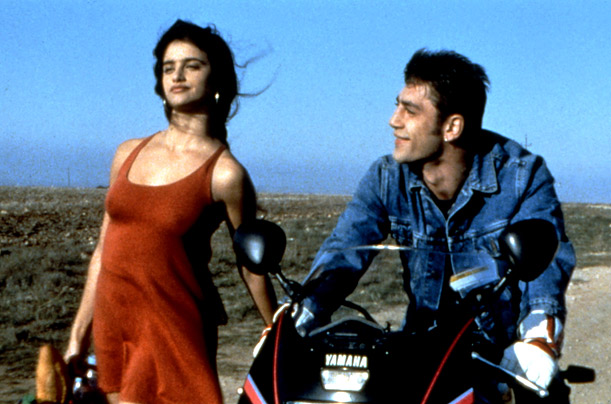
At the beginning of his trilogy of movies that deal with erotica and Spanish culture, Bigas Luna made “Jamón Jamón” (literally “Ham, Ham”, distributed as “A Tale of Ham and Passion”). The alternate title is pretty much the thematic core of the film – it’s a film about sex, bullfighting, passion, and the ham industry, which are some of the main stereotypical notions of Spain from both foreigners and the Spanish people.
The film is about a (sort of) love triangle between Silvia (Penélope Cruz), Raul (Javier Bardem), and José Luis (Jordi Mollà) that turns into something more complicated. It’s a tragicomic and surreal journey into human primal instincts.
It’s also a satire toward many traditional and modern representations of Spain, especially the machismo of the male heroes of this story. Erotica is mixed with comedy (sometimes of a gross-out type) and everything is so irresistibly over the top. Luna also balances comedy and tragedy quite well, especially near the end of this dark and surreal melodrama.
11. Moon Child (El nińo de la luna, 1989) – directed by Agustí Villaronga
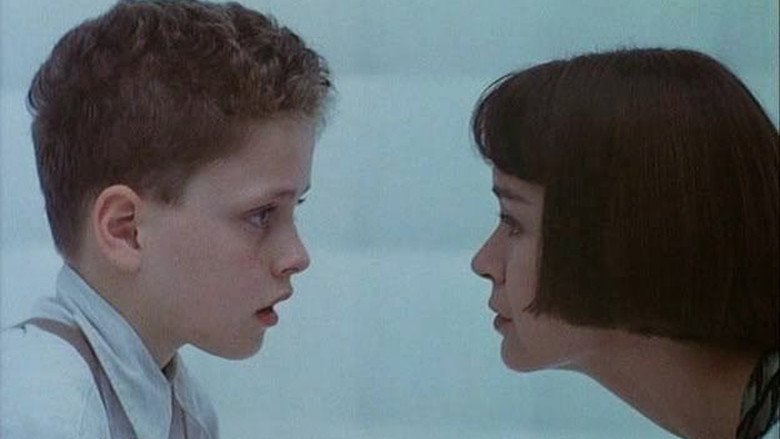
“El niño de la luna” is Agustí Villaronga’s second full length film, and for a long time, his most hard-to-find film. It can be called a fairytale with traditional Villaronga horror moments; it is definitely ‘softer’ than his previous film, “Tras el cristal” (“In a Glass Cage”), but it’s also not your usual fairytale.
The story revolves around a boy, David (Enrique Saldana), who is adopted by a strange cult because he possesses supernatural capabilities and thus, is perfect for their research. They are trying to create a new superior being, a Moon Child, with energy from the Moon collected in a newborn child. But David is also (according to the prophecy) a real Child of the Moon, and them creating another Moon Child would mean he is robbed of his powers. He will then go on a journey to Africa, where his prophecy must be fulfilled.
The cinematography is again beautiful (as is usual with Villaronga’s films), and again as in “Tras el cristal”, the color blue is prevalent. Mystical elements are present throughout the movie; in the first part through the various geometrical figures forming mystical symbols, the scenes where the Full Moon is used as a part of the ritual for conceiving the Moon Child, and also later when David goes to Africa to fulfill his destiny.
The story is appropriately hermetic and that does not go against the film – on the contrary, it gives basis for some beautiful directorial solutions that suck us into the mystical and fairytale–like atmosphere.
The music is beautiful and is composed by Dead Can Dance. The singer of the group, Lisa Gerrard, plays one of the main characters who helps David escape the strange cult and go on the mystical journey to Africa. “El niño de la luna” is, in terms of quality, a little under his previous “Tras el cristal”, but it’s also an excellent film. It’s a beautiful, inspiring, magical work, and a criminally underrated Spanish film that needs to be widely recognized and praised.
10. Butterfly’s Tongue (La lengua de las mariposas, 1999) – directed by José Luis Cuerda
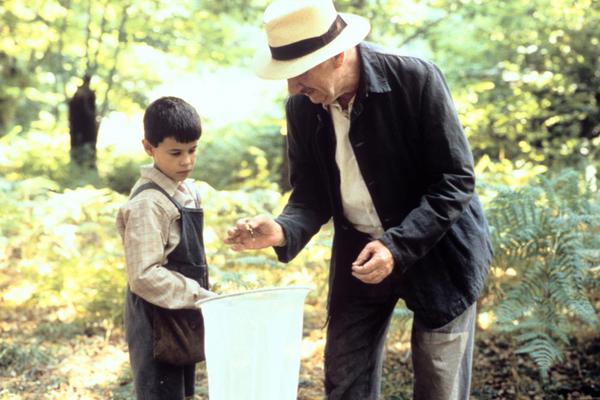
The Spanish Civil War and the way it affects people, especially children, is (understandably) one of the most frequent themes in Spanish cinema, and this film is a successful example of that. It is directed by José Luis Cuerda, who also directed the interesting surreal comedy “Amanece, que no es poco” and produced Alejandro Amenábar’s movies “Tesis”, “Abre los ojos”, and “The Others” (Amenábar composed music for this film).
The story follows a boy, Moncho (Manuel Lozano), who has just started school, and befriends the teacher, Don Gregorio (Fernando Fernán Gómez). He sometimes accompanies his older brother, a saxophone player, to his concerts and frequently goes into nature, chasing butterflies. His idyllic childhood is interrupted when fascists come to power and he has to face the other realities of life.
Cuerda does not explicitly feature politics in the film; it’s mostly in the background, except at the end of the film. The focus is on Mocho and his various lessons about life, big and small, of positive and negative natures.
Lozano’s acting is very natural and convincing; he really succeeds in showing all the turmoils his character is going through. Gómez is wonderful as the teacher who befriends Mocho. The film is equally a poetic ode to life and childhood, and a sad reminder of the horrors that can stop that process and forever shatter one’s illusions of life.
9. Matador (1986) – directed by Pedro Almodovar
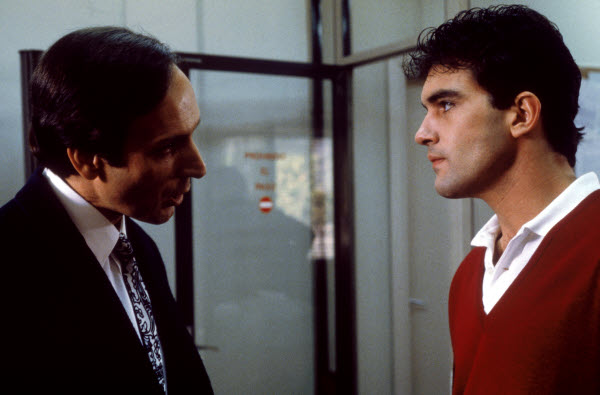
The first phase of Almodovar’s career (until the “Women on the Verge of a Nervous Breakdown”) is a very interesting collage of black humor, sharp satire, and alternate sexuality (elements also present in his other films but to a lesser degree).
As in his other films, camp and kitsch are freely used as a part of the scenography as an attempt to bring the characters to the foreground, and the characters from his first movies are more outrageous than in his later movies. All the possibly ‘risky’ elements are mostly used for comedic and satirical purposes, in the process creating interesting, subversive. and funny works.
“Matador” is no exception to this, though the movie was not a big success critically and commercially. The answer to that probably lies in its tone and themes, both going to a darker place than the other films from this period, which is a real shame, because “Matador” is one of the better and most underrated works from Almodovar.
It’s a film about the relationship between Eros and Thanatos; it is centered around two people obsessed with sex and death, and another man with recurring visions of violent crimes, with victims killed during sexual acts. In one of the scenes we see a girl, Maria (Assumpta Serna), killing a man during sexual intercourse by stabbing him in the neck, which is intercut with the scene of another man, Angelo (Antonio Banderas), killing a bull with the sword stabbed in his neck.
A necrophilic atmosphere pervades the film, with many moments of black humor. It has many satirical touches like other Almodovar films from his first phase, and is overall very consistent in its quality. It’s another great candidate for reevaluation.
8. Common Wealth (La comunidad, 2000) – directed by Álex de la Iglesia
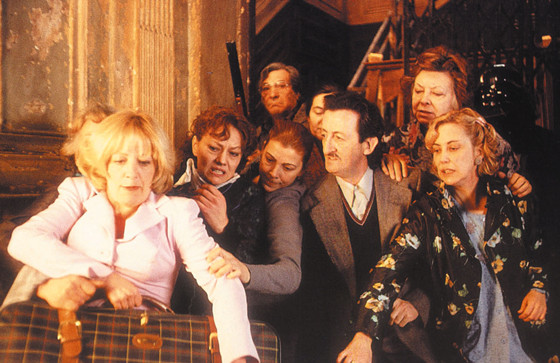
After “Perdita Durango”, Álex de la Iglesia made the solid comedy “Muertos de risa”, but his true return to form would be “La comunidad”, a mix of comedy, action, and horror in the well-known de la Iglesia style. It is a blackly funny and satirical film about Julia (Carmen Maura), a real estate agent who finds a large sum of money in the apartment of a dead man. This is the opportunity of a lifetime, she thinks – but the neighbors and the entire community of the building wants the same thing, and chaos enues.
The acting is wonderful from all involved, the pacing is frenetic, and the movie never loses its tempo. Action is mixed with black humor and horror while we observe how greed transforms people into monsters.
De la Iglesia uses strategies from his previous movies, especially “El dia de la bestia”, to expose the lowest human impulses in both hilariously funny and scary situations. Certainly one of the best of his works, “La comunidad” deserves much more recognition than some of his later works. It’s a wonderful and smart film from an immensely talented director.